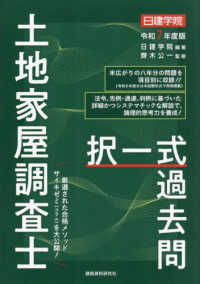Full Description
The first decade of the 21st century has witnessed the decline of multiculturalism as a policy in Western countries with tighter national border controls and increasing anti-migration discourse. But what is the impact of multiculturalism in East Asia? How will East Asian nations develop their own policies on migration and multiculturalism? What does cultural diversity mean for their future?
Multiculturalism in East Asia examines the development and impact of multiculturalism in East Asia with a focus on Japan, South Korean and Taiwan. It uses a transnational approach to explore key topics including policy, racialized discourses on cultural diversity and the negotiation process of marginalized subjects and groups. While making a contextualized analysis in each country, contributors will consciously make a comparison and references to other East Asian cases while also situating this as well as put their case in a wider transnational context.
Contents
1. Rethinking Multiculturalism from a Trans-East Asian Perspective, Koichi Iwabuchi, Kim Hyun Mee, Hsiao-Chuan Hsia / Section 1: Multiculturalism Policy Discourse: Critical interrogation / 2. Korean Multiculturalism and its Discontents, Ji-Hyun Ahn / 3. Multicultural Taiwan: Policy developments and challenges, Li-Jung Wang / 4. Multicultural co-living (tabunka kyosei) in Japan: Localized engagement without multiculturalism, Koichi Iwabuchi / Section 2: Racialization of multicultural situations / 5. The Racialization of Multicultural Families by Media in a Multicultural Nation, Jung Hyesil / 6. Legislating Race and the Nation in Taiwan: How Immigration Laws Embodies the Dark Side in the Nation-building Process, Bruce Yuan-Hao Liao / 7. Intersecting Japanese Nationalism and Racism as Everyday Practices: Toward Constructing a Multiculturalist Japanese Society, Yuko Kawai / Section 3: Cultural politics of multicultural subject makings / 8. Can 'multicultural soldiers' serve the nation? The social debate about th








